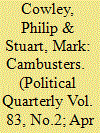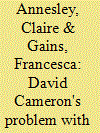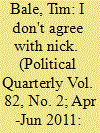|
|
|
Sort Order |
|
|
|
Items / Page
|
|
|
|
|
|
|
| Srl | Item |
| 1 |
ID:
112090


|
|
|
|
|
| Publication |
2012.
|
| Summary/Abstract |
The backbench rebellion that hit the Coalition government in October 2011 was one of the largest Commons revolts of the postwar era, on any issue. But it was not just its size that was noteworthy. This article outlines ten points about the origins of the vote, its timing, its composition, and the nature of the divisions it revealed. Facilitated by recent procedural innovations in the Commons, the rebellion was both evidence of a longer-term rise in dissent amongst MPs of all parties, as well as other medium-and short-term factors within the Conservative party. It leaves the Prime Minister caught in an impossible triangle, attempting to satisfy his pro-European Liberal Democrat partners in the Coalition, while keeping his Euro-sceptic rebels happy, and yet retaining enough credibility in European capitals to negotiate successfully.
|
|
|
|
|
|
|
|
|
|
|
|
|
|
|
|
| 2 |
ID:
118224


|
|
|
|
|
| Publication |
2012.
|
| Summary/Abstract |
Prior to the election in 2010 David Cameron pledged that his first cabinet would comprise one-third women and would be the most family friendly ever. Since forming the Coalition Government, he appears to have a 'problem' with women. We argue that this problem stems from: the weak representation of women in cabinet and across government; the diminishing resources available to government actors to support gender equality policy; and women's exclusion from the key Coalition networks, both formal and informal, that determine government policy.
|
|
|
|
|
|
|
|
|
|
|
|
|
|
|
|
| 3 |
ID:
118709


|
|
|
| 4 |
ID:
120453


|
|
|
|
|
| Publication |
2013.
|
| Summary/Abstract |
This article seeks to explain the decisions by Nicolas Sarkozy's France and David Cameron's Britain to intervene in the 2011 Libyan crisis. None of the three major theories of international relations-constructivism, defensive realism and liberalism-can explain on its own such intervention decisions as the Libya case. The article's novel analytical model proposes that each theory emphasizes factors and mechanisms that explain part of the decision-making process and that these factors interact with state behaviour in complex ways. Britain and France initially began to consider intervention because they felt that the emergent norm of the 'responsibility to protect' applied to the Libyan case and because they believed the massive flows of refugees fleeing the violence were a threat to their border security. Both countries believed military intervention could be successful at relatively low cost and that if they did not intervene the problem would not be solved. At that point, the Sarkozy and Cameron governments engaged in initial action that made them more likely to intervene by jeopardizing their future economic relations with the Gaddafi regime and making him more likely to threaten them with future terrorist attacks. Taking initial action also meant that French and British prestige would ultimately have suffered had they not intervened to achieve a satisfactory solution to the crisis. Paris and London viewed international and regional support as a critical prerequisite for intervention and they sought and attained it. Finally, the Sarkozy and Cameron governments were able to minimize any domestic political risk of intervening because they had public and/or opposition party support.
|
|
|
|
|
|
|
|
|
|
|
|
|
|
|
|
| 5 |
ID:
092372


|
|
|
|
|
| Publication |
2009.
|
| Summary/Abstract |
This article traces the development of the Conservative party's 'broken society' narrative, from its roots in William Hague's early invocations of 'social justice' to the evidence-based approach adopted by David Cameron. It considers relevant social trends over the period since 1970; summarises the Conservative party's attitude to family policy in government between 1979 and 1997; and shows how the Conservatives in opposition from 1997 onwards have become more focused on support for the marriage-based family, now a central tenet of Conservative social policy under David Cameron's leadership.
|
|
|
|
|
|
|
|
|
|
|
|
|
|
|
|
| 6 |
ID:
105869


|
|
|
|
|
| Publication |
2011.
|
| Summary/Abstract |
Insider and journalistic accounts of the formation in May 2010 of the Conservative-Liberal Democrat coalition actually, although not explicitly, rely on types of explanation familiar to those who study politics. They tell us that structure (or at least the economy) was important. So too, they suggest, were institutions (timing and the rules of the game). They also stress the importance of contingency ('events, dear boy, events') and agency (who did and said what to whom). While none of these things were unimportant, they only served to make certain an outcome that anyone with a passing acquaintance with the theory and the practice of coalition formation would have predicted-namely a 'minimum winning coalition'. The only thing that could have made that outcome uncertain was a fundamental ideological difference between the two parties involved; however, it quickly became apparent-to the surprise of those of us who failed to appreciate how much the Liberal Democrats had changed-that no such difference existed. Indeed, it is possible to argue that the coalition formed was not merely minimum winning but 'minimum connected winning'. As such, its formation was not so much breathtakingly bold and exciting as pretty much inevitable. In the end, the maths and the physics mattered more than the chemistry. Fortunately for the Conservatives, the Liberal Democrats seriously underplayed their hand in the negotiations, with possibly disastrous consequences for them in the long term.
|
|
|
|
|
|
|
|
|
|
|
|
|
|
|
|
| 7 |
ID:
133235


|
|
|
|
|
| Publication |
2014.
|
| Summary/Abstract |
'Mindless' empiricism rules in British central government, bolstered by the use of prerogative powers and the absence of any 'court of appeal' to insist on definitions and uniformities. This gives arguments about quangos-arm's-length bodies-a surreal quality. The Cameron coalition has created many new quangos, while claiming a cull. Unless and until Whitehall acquires, or is forced to acquire, better habits of mind, it may be a waste of time for academics and reformers to prepare taxonomies and call for more administrative rationality.
|
|
|
|
|
|
|
|
|
|
|
|
|
|
|
|
| 8 |
ID:
127001


|
|
|
|
|
| Publication |
2013.
|
| Summary/Abstract |
This article examines why a Liberal Democrat-Labour Coalition did not result from inter-party negotiations after the General Election in May 2010 and whether the coalition which did emerge was based on a marriage of 'neo-liberal minds', as claimed by Andrew Adonis in his 5 Days in May (Biteback, 2013). Consideration of the available evidence, however, suggests a more nuanced conclusion. It is expected that the 2010 agreement will be revisited in preparation for a possible hung parliament in 2015.
|
|
|
|
|
|
|
|
|
|
|
|
|
|
|
|
|
|
|
|
|